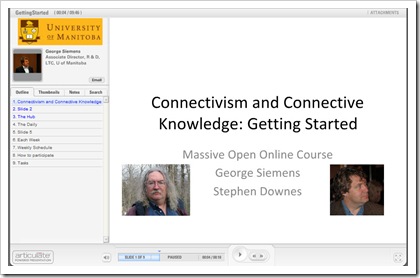I often blog about adult and continuing education. Makes sense–I am a senior instructional designer, adjunct instructor at New York University, and organizational learning and communication consultant.
I live and breathe teaching and learning, and with many of my influences (Lyotard, Mezirow, Brookfield, and Denzin, among others) encouraging (critical) reflective practice, I tend to regularly toss ideas and experiences around in my mind for extended periods of time. This is after all the purpose (and by-line) of my blog Silence and Voice itself:
Reflective practice in organizational learning, educational technology, and postmodern society.
It was with some surprise to have Deb Peterson find something that piqued her interest and write about it on her About.com blog. She was very generous in her comments, and it certainly made my morning when I learned about it yesterday. It serves to remind me that we never know who finds our work online–colleagues, future colleagues, current / future / past students, clients, friends, and the like. Once our words are out there and shared online, then the public face we wear may show interesting signs of what it means to be a (critical) reflective practitioner. Sometimes it works well, and sometimes it may be more challenging.
With our world increasingly connected and decreasingly isolated, it is no wonder that George Siemens and Stephen Downes have been able to gather 1900+ of their closest friends (and a few colleagues as well) to discuss Connectivism and Connective Knowledge (cck08), which I think speaks nicely to this experience. Interesting how Deb’s comments about my work and thinking helps me to connect some online (and internal) dots. I suppose we never know when opportunities for reflective practice arise.
The world is getting smaller and more connected indeed . . . what an exciting present and future!
